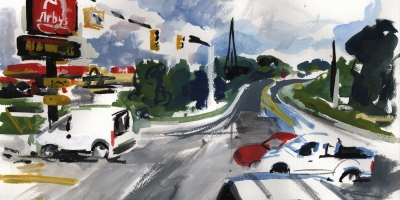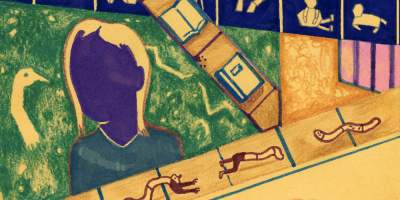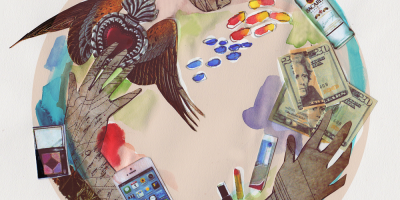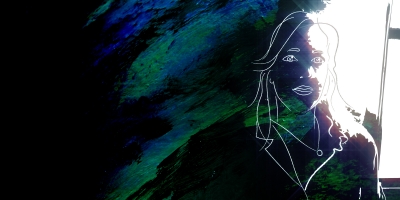Fiction
The Invention of History
by Luke Dani Blue

A Fall (Before)
Yudel’s handsome son, sent off in black boots to swing a rifle for Mother Russia. We yearned for him over yeasty dough, the whelp of stray dogs coughing road dust, hay dust, sawdust. Twenty-five years, the order said, but prayer stronger than orders brought him back whole in nine. Leaves turning from gold to red fell behind him like a royal cape.
That night, we found Faiga’s goose broken-necked on the bare earth behind the school. In the morning, field to wood had frozen, walking outdoors as stunning as the feeling of just waking, when past and future are equally forgotten and for a briefness each of us could be anyone.
First Winter
The council was a condition of our internment, the first thing we had, its volunteers young men with early-ruined skin. Because of our distrust for conscripts, we ground their names into the frosty streets. “Councilmember,” we called them, but only when necessary.
After the council, boys organized a soccer league; women, a trade in bread and other goods; while the writers, gone ever stranger, folded parchment into coat linings, buried books alive.
I don’t remember who thought of the jail, only that we heard the cell walls settling at night.
In the baths, dingy water crawled over women’s backs, round shoulders flickering in candlelight. Sweat dripped into the pools.
The tang of menstruation contained a whole family line: daughter, mother, grandmother. Our collective memory.
Eyes fixed on the water, on nothing. We made chitchat as women do, while under the surface, blood became shuddering. A slick on the tips of the fingers, a fast heat, nothing more.
The normal world continued within our walls, but shrunken. The real problem was bodies, which is why some of us became flies and others worms; still others flattened into paper, learning to fold.
Eight families shared a kitchen in what had been previously called coat closet. We ate potatoes and beets and beans and bread. When there wasn’t any, we chewed the insides of our cheeks, pinched beetles from the window frames. Windows made of real glass, frames of molded wood. In spite of everything, we admired the artistry of our first city home.
We didn’t remember who built the prison, who commissioned blueprints, who mortared bricks. “Them,” we said. In the council’s record, it was titled only “That lamentable place.” The oldest among us, charged with memory, said They’d forced us. There’d been an order perhaps, a threat, someone shot in the streets? Already we began to forget these simple things. In the time before—though even that was becoming suspect—we didn’t require the past to be fixed, and so were in the habit of inventing from present needs. Bearded men licking wide pink lips gave us History. While cooking or scavenging at the edges of our place, we sang it, teaching ourselves to remember in this new way. Whoever had built the prison, we were grateful. It gave us a reason to avoid mistakes, and anyway, someone had to go. In History, we remembered the story of Isaac and the punishment of the Gomorrhites, and how in particular epochs, G-d required a sacrifice of blood.
Second Winter
We dreamed of smoke trailing into the gray skies, slept in piles like rats. On pesach, it was rumored a mother roasted her own child over field potatoes, tried to hang herself. We began to suspect it was true what They said about us. Or anyway, the bad apples. We thanked G-d for the jail He had created, which we could use to root them out. We memorized History and our recitations improved. We recalled how, for centuries, They had done this to us, the swindlers, baby killers, horned devils: our imposter-brethren. We remembered Yudel’s son, the glaze in his eyes when he returned from Ukraine, his breath stinking and skin yellowed, rotten in places. Earth running like blood beneath his boots. Among our numbers slithered tens of these sons, then hundreds. Even at night we watched for them.
In the women’s baths, we stripped naked and crowded close. The big women had shrunk, but the skinnies were the same, all hard angles and stretched laughter. Their long necks wound with tendons, their spines notched like time’s measuring tape. When our bones came together, we made a sound like a neighbor knocking on a faraway door, nobody answering.
I recognized the sound. A door from my dreams. Bronze handle curled against varnished wood. In the night, a fist collided with that door, pounding some of us from our beds, others into the hollow wall. The apartment became clearer after that, more room to cook and you could get decent sleep when it wasn’t too cold. A woman college graduate recited a play about whining gods ravenous for ash. No one laughed at the Greek jokes; we were fathoming our Lord’s appetite.
In the jail, people multiplied, then disappeared. Weight slid from our shoulders. We floated over the streets instead of plodding. A man famous for kindness to the demented was arrested for vagrancy. He’d fallen asleep on the yeshiva courtyard’s sun-warmed stones. Fortunately, the Rebbe found him before anyone could trip and hurt themselves. That afternoon, I breathed crisp spring as they dragged him by, hands covering his face, maybe weeping or maybe asleep. The sky rumbled, and I forgot to watch where they took him. Perhaps he folded himself into wings. Later I recalled a story about this, how in dire circumstance G-d saves His chosen.
That night it poured rain.
Our impression of History was improving, and the teacher praised us. We knew the territories of Europe, the dates of the Inquisition, world leaders of 1902. We no longer remembered if there’d been a time before we lived together here in our emptying rooms or the names of those who’d left. So the teacher taught us that too: the number of fires we’d suffered, the beatings, the rapes, the deaths of the firstborn.
“Have we always been here?” one of our men asked.
“No,” said the teacher, “but everywhere has been identical. The same rules, the familiar spices, the old rituals. Soccer even is played according to tradition.” We looked out the window at the children like fallen hawklings, pounding the ball with their feet. Their dust drew figures on the glass.
“Will we ever escape?” asked the man.
“G-d made the universe as a linked passage of rooms,” said the teacher. “Leave one and another awaits, then another, then another. But they all contain the same furniture.”
Our place grew enormous. We stretched our arms, waved our wrists in circles to test the boundaries. They did not give.
One of the bathing women’s hair stunk like gunpowder. I pulled her close, making the chilly water heave.
“We’ve stockpiled arms. We are only waiting for you,” she whispered.
“Who’s we?”
“Some of us. I can’t say.”
“To what end?” I asked.
“Freedom,” she said. “To how it was before.”
Beneath us, the earth’s wet flesh shook.
Before, I thought and remembered Babylon, a map of World War, a chalky smear.
Before, I thought and remembered everything.
In History, we learned the future. It was the same. We learned time was static. The teacher held a device we’d never seen before—although, on the other hand, we might have. A silver-cased mirror that flickered at a touch and produced animal murmurs, colors that bore and burned. Tablet, he called it, stroking the glass. A map of our place appeared: its walls, its trampled courtyards, its three story buildings, their mazes of flats. The map blinking with labeled dots.
“Us,” said the teacher, tapping a blue circle: Arklių 3, Teacher’s House.
We saw our faces there, fanned backward and forward as in mirrors facing mirrors. We grew dizzy with the present and our own knowing. Wondered if the Israelites at Sinai felt the same.
“Where is History?” asked someone.
The teacher shrugged, withdrew the glass.
“Outside,” he said. We echoed his indifference.
When the traitors wriggled to the surface, hard lines folded into jackets, I recognized her immediately.
“That one,” I declared, pointing, refusing to turn away. Swiftly, four councilmen were upon her, holding her to the stones. Her hair—it looked different in the day, a cyclone of curls—fanned out under their knees. The other worms bared their rifles. They pressed the barrels to our ribs, said we deserved the death we had coming.
“All time is this one room,” I shouted, making myself hoarse. “The only future lies behind!”
I thought of the woman’s moon shoulders strung pink from someone’s nails, the taste of salt on someone’s tongue, great shockwaves moving upward through the water as a name rang out against the wooden walls, out into the bloodblack sky. She was singing.
I was singing.
“They’re gone,” said the others.
I’d been calling to no one. In fact, I was in the kitchen, my hissing breath mimicking steam.
Later, I learned they’d taken her to the jail and even later that she’d never existed. She had no name, no place of birth, no living descendent; she did not appear blinking on the map.
I was just grateful the jail had always been there, that we had a soccer team even if no teammates, a tidy kitchen, a classroom—more space every day. We were rich. Now I’d seen us on the map, I knew we’d be there forever.





